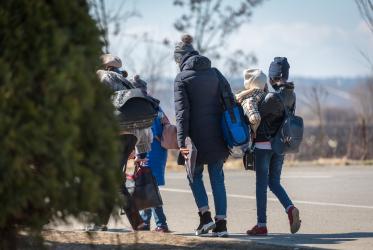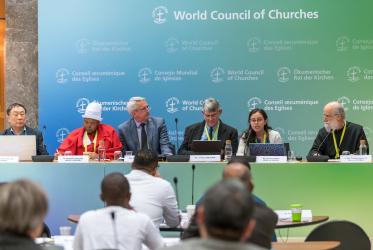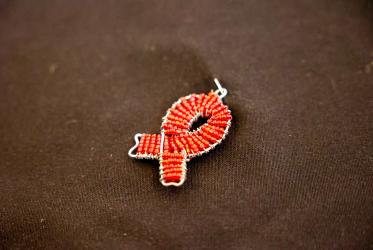Consultation on HIV/AIDS: A challenge for religious response
Chiang Mai, Thailand
25-30 November 2001
We, the participants of the CCA Consultation on HIV/AIDS: A Challenge for Religious Response" held in Chiang Mai Thailand from November 25-30 2001, having heard, discussed and deliberated on reports about the care and treatment of people living with HIV/AIDS from 14 countries in the Asia Pacific region.
Celebrate with joy:
-
The solidarity, strength and support extended by the world community, especially the community based organizations, religious institutions, non government organizations and faith based organizations in addressing the HIV/AIDS crisis that threatens to be the most devastating disease of the twenty first century
-
The encouraging signs of new drugs in the medical field that mitigate suffering and extend the life span of people living with HIV/AIDS
-
The great strides made in the field of health care, hospitals, children's homes and awareness education by the increasing number of organizations both secular and religious, committed to this cause
-
The indomitable spirit, courage, wisdom, foresight and timely action taken by some countries like Thailand to combat HIV/AIDS
Yet in spite of all these encouraging signs, we are appalled at the statistics that remain staggering.
An affirmation of faith
God created all and cares for everyone. The God we strive to follow is one who hears the cries of suffering people and inspires us to work for a better world.
Jesus the great and beloved physician, the good shepherd, the rock and the refuge, calls us to be good and compassionate neighbors, loyal and faithful friends like those who lowered their sick friend from the roof of the house.
Churches and faith-based organizations are challenged to follow in the footsteps of the Lord
-
who stood with people who were marginalised, discriminated against and stigmatized,
-
who healed not only physical ailments but understood and healed the deep scars and wounds inflicted by society
-
who wept and empathized with human suffering
The Asian situation
According to UNAIDS estimates more than 15 million people are living with HIV/AIDS in Asia. HIV/AIDS cuts across geographical boundaries, class, gender, sexual orientation, ethnicities and age groups. Though it has devastating influences in both rich and poor nations, it has spread more rapidly in poor and developing countries, further aggravating the economic conditions and its social consequences. The more affluent Asian countries have had the capacity to limit the progress of HIV/AIDS infection due to effective health promotion programs, the availability and affordability of anti retroviral treatments and better comprehensive health care and support.
The epidemiological pattern of HIV varies in countries and within countries. Governments are afraid to recognize, accept and admit the existence of AIDS as they believe it would be detrimental to tourism and foreign investments. But countries like Thailand that have dared to openly admit the existence of AIDS have succeeded in reducing the numbers affected as anticipated in the projections made by UNAIDS.
Emerging issues and challenges
We view with concern the following emerging issues and challenges arising out of this ongoing crisis:
-
Despite the encouraging developments PLWHA still face significant discrimination and stigmatization and are denied the opportunity to fully participate in their communities. This stigma also extends to and affects other members of the families of PLWHA and can be especially traumatic for children.
-
Many social, cultural practices and beliefs contribute to the escalation of HIV and are barriers to conveying effective HIV prevention messages. These practices also inhibit open and honest discussion of human sexuality, both in the church and in society
-
Women and children are placed at great risk of HIV because they have the least power to negotiate safe sex. Due to cultural and biological factors women and children are more vulnerable to sexual exploitation and HIV infection. In some countries, widows of HIV positive husbands are denied the right to inheritance leading to economic exploitation.
-
HIV positive children born to HIV positive parents may die within ten years. Children who are HIV negative continue to bear the stigma and are forced into situations or practices where they are exposed to HIV such as through intravenous drug use or sex work, because of rejection by peers and society, lack of love and hope, thus continuing the vicious cycle.
-
The impact on families where parents have died or can no longer care for children and elderly people is enormous. Elderly people in turn have to care for their grandchildren when they themselves may be frail and in need of care. The loss of people who are in the productive age group of 19-44 has a huge social and economic impact.
-
Market dynamics due to the World Trade Organization's policies and other financial instruments like patent rights and intellectual property rights have inflated the cost of treatment and drugs, putting these new drugs out of the reach of the majority of PLWHA who come from developing countries.
-
Developing countries that are faced with the burden of poverty and massive debt repayments find it difficult to allocate sufficient funds to the prevention and treatment of HIV/AIDS.
A call to action
HIV/AIDS is an ongoing crisis that requires a sustained and sustainable response at multisectoral and multifaith levels.
Therefore the church is called to be a healing community and to be a model of compassion and love for all.
The church at all levels, international, regional, national and local, has an important role to play in:
-
challenging the negative, judgmental attitudes that still exist towards people with HIV/AIDS
-
decreasing fear and misconceptions about of HIV/AIDS
-
providing accurate information about HIV/AIDS, including prevention information, and information about HIV services that may assist PLWHA
-
encouraging equal participation of PLWHA in planning and delivering HIV/AIDS programs and services
-
providing practical and pastoral support for people living with HIV/AIDS and their families, especially to women and children
-
advocating for appropriate legislation and policies, that address the needs and rights of PLWHA, which include access to treatment and medicine and respect for the human rights of PLWHA
-
engaging in prayerful dialogue and networking with other churches, faith communities and secular organizations in order to encourage each other in the ongoing struggle to meet the challenge of HIV/AIDS
We call on the Governments of Asia:
-
To affirm the human rights and dignity of all people, including those living with HIV/AIDS, especially women and children
-
To legislate against discrimination and stigmatization by ensuring the basic rights of people with HIV/AIDS and their families to adequate health care, education and employment
-
To allocate adequate resources and provide programs that serve to decrease the incidence and impact of HIV/AIDS in the region
We call on International Organizations/Institutions such as the UN and its agencies, the World Bank, IMF and Asian Development Bank to:
-
Waive debt repayments of developing countries so that funds can be diverted to HIV/AIDS programs
-
Ensure that financial agreements made by the signatories to the World Trade Organization, like TRIPS that is due to take effect in 2005, should not prevent Governments from producing life saving drugs for people with HIV/AIDS at affordable prices
-
Ensure that public health aspects are not taken over by economic interests of the multinational pharmaceutical companies
-
Increase allocation of funds for development assistance for developing countries, in recognition of the broader issues of poverty linked to HIV/AIDS
Conclusion
This then is the time
-
to heal,
-
to care, not only by providing services, but also by standing alongside with love
-
to build a community of belonging and acceptance
-
to transform prejudice into compassion, healing and understanding
-
to overcome injustice and discrimination
-
to live with hope and die with dignity
Consultation on HIV/AIDS: A challenge for religious response
Chiang Mai, Thailand
25-30 November 2001
We, the participants of the CCA Consultation on HIV/AIDS: A Challenge for Religious Response" held in Chiang Mai Thailand from November 25-30 2001, having heard, discussed and deliberated on reports about the care and treatment of people living with HIV/AIDS from 14 countries in the Asia Pacific region.
Celebrate with joy:
-
The solidarity, strength and support extended by the world community, especially the community based organizations, religious institutions, non government organizations and faith based organizations in addressing the HIV/AIDS crisis that threatens to be the most devastating disease of the twenty first century
-
The encouraging signs of new drugs in the medical field that mitigate suffering and extend the life span of people living with HIV/AIDS
-
The great strides made in the field of health care, hospitals, children's homes and awareness education by the increasing number of organizations both secular and religious, committed to this cause
-
The indomitable spirit, courage, wisdom, foresight and timely action taken by some countries like Thailand to combat HIV/AIDS
Yet in spite of all these encouraging signs, we are appalled at the statistics that remain staggering.
An affirmation of faith
God created all and cares for everyone. The God we strive to follow is one who hears the cries of suffering people and inspires us to work for a better world.
Jesus the great and beloved physician, the good shepherd, the rock and the refuge, calls us to be good and compassionate neighbors, loyal and faithful friends like those who lowered their sick friend from the roof of the house.
Churches and faith-based organizations are challenged to follow in the footsteps of the Lord
-
who stood with people who were marginalised, discriminated against and stigmatized,
-
who healed not only physical ailments but understood and healed the deep scars and wounds inflicted by society
-
who wept and empathized with human suffering
The Asian situation
According to UNAIDS estimates more than 15 million people are living with HIV/AIDS in Asia. HIV/AIDS cuts across geographical boundaries, class, gender, sexual orientation, ethnicities and age groups. Though it has devastating influences in both rich and poor nations, it has spread more rapidly in poor and developing countries, further aggravating the economic conditions and its social consequences. The more affluent Asian countries have had the capacity to limit the progress of HIV/AIDS infection due to effective health promotion programs, the availability and affordability of anti retroviral treatments and better comprehensive health care and support.
The epidemiological pattern of HIV varies in countries and within countries. Governments are afraid to recognize, accept and admit the existence of AIDS as they believe it would be detrimental to tourism and foreign investments. But countries like Thailand that have dared to openly admit the existence of AIDS have succeeded in reducing the numbers affected as anticipated in the projections made by UNAIDS.
Emerging issues and challenges
We view with concern the following emerging issues and challenges arising out of this ongoing crisis:
-
Despite the encouraging developments PLWHA still face significant discrimination and stigmatization and are denied the opportunity to fully participate in their communities. This stigma also extends to and affects other members of the families of PLWHA and can be especially traumatic for children.
-
Many social, cultural practices and beliefs contribute to the escalation of HIV and are barriers to conveying effective HIV prevention messages. These practices also inhibit open and honest discussion of human sexuality, both in the church and in society
-
Women and children are placed at great risk of HIV because they have the least power to negotiate safe sex. Due to cultural and biological factors women and children are more vulnerable to sexual exploitation and HIV infection. In some countries, widows of HIV positive husbands are denied the right to inheritance leading to economic exploitation.
-
HIV positive children born to HIV positive parents may die within ten years. Children who are HIV negative continue to bear the stigma and are forced into situations or practices where they are exposed to HIV such as through intravenous drug use or sex work, because of rejection by peers and society, lack of love and hope, thus continuing the vicious cycle.
-
The impact on families where parents have died or can no longer care for children and elderly people is enormous. Elderly people in turn have to care for their grandchildren when they themselves may be frail and in need of care. The loss of people who are in the productive age group of 19-44 has a huge social and economic impact.
-
Market dynamics due to the World Trade Organization's policies and other financial instruments like patent rights and intellectual property rights have inflated the cost of treatment and drugs, putting these new drugs out of the reach of the majority of PLWHA who come from developing countries.
-
Developing countries that are faced with the burden of poverty and massive debt repayments find it difficult to allocate sufficient funds to the prevention and treatment of HIV/AIDS.
A call to action
HIV/AIDS is an ongoing crisis that requires a sustained and sustainable response at multisectoral and multifaith levels.
Therefore the church is called to be a healing community and to be a model of compassion and love for all.
The church at all levels, international, regional, national and local, has an important role to play in:
-
challenging the negative, judgmental attitudes that still exist towards people with HIV/AIDS
-
decreasing fear and misconceptions about of HIV/AIDS
-
providing accurate information about HIV/AIDS, including prevention information, and information about HIV services that may assist PLWHA
-
encouraging equal participation of PLWHA in planning and delivering HIV/AIDS programs and services
-
providing practical and pastoral support for people living with HIV/AIDS and their families, especially to women and children
-
advocating for appropriate legislation and policies, that address the needs and rights of PLWHA, which include access to treatment and medicine and respect for the human rights of PLWHA
-
engaging in prayerful dialogue and networking with other churches, faith communities and secular organizations in order to encourage each other in the ongoing struggle to meet the challenge of HIV/AIDS
We call on the Governments of Asia:
-
To affirm the human rights and dignity of all people, including those living with HIV/AIDS, especially women and children
-
To legislate against discrimination and stigmatization by ensuring the basic rights of people with HIV/AIDS and their families to adequate health care, education and employment
-
To allocate adequate resources and provide programs that serve to decrease the incidence and impact of HIV/AIDS in the region
We call on International Organizations/Institutions such as the UN and its agencies, the World Bank, IMF and Asian Development Bank to:
-
Waive debt repayments of developing countries so that funds can be diverted to HIV/AIDS programs
-
Ensure that financial agreements made by the signatories to the World Trade Organization, like TRIPS that is due to take effect in 2005, should not prevent Governments from producing life saving drugs for people with HIV/AIDS at affordable prices
-
Ensure that public health aspects are not taken over by economic interests of the multinational pharmaceutical companies
-
Increase allocation of funds for development assistance for developing countries, in recognition of the broader issues of poverty linked to HIV/AIDS
Conclusion
This then is the time
-
to heal,
-
to care, not only by providing services, but also by standing alongside with love
-
to build a community of belonging and acceptance
-
to transform prejudice into compassion, healing and understanding
-
to overcome injustice and discrimination
-
to live with hope and die with dignity





